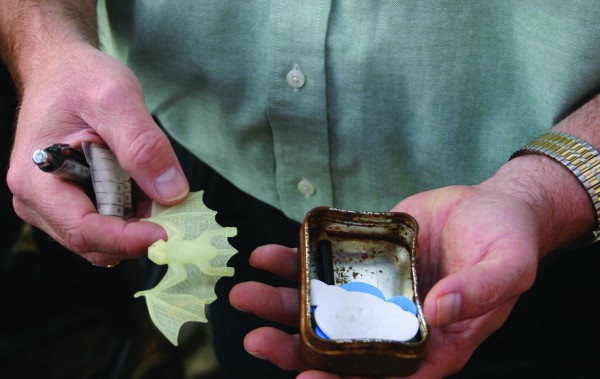
Outside of their classrooms, beyond the constraints of their desks and set free from their chalkboards, who are our professors? Are they pipe makers, karaoke singers or travelers of the world? Or do they perhaps geocache and storm chase?
David Allen, assistant professor of education, does just that. Throughout his life he has been both an active storm chaser as well as a geocacher.
Introduced to geochaching by his wife, Allen described geocaching as a great way to get outside and enjoy the outdoors.
“It’s kind of like a little treasure hunt. People will hide a little canister of some sort, and then they will put in coordinates and then you go and find them,” Allen said.
To access the coordinates for geocaches, all it takes is signing up for a free account on geocaching.com and typing in a zip code to find caches nearby. From there, all it takes is a GPS device or a smart phone to type the coordinates into and find the geocache.
Once it has been located, the finder may open the container and extract one item, if and only if they replace it with something of equal or lesser value. Geocaches can contain anything from travel mementos of past finders, to small trinkets, all the way to small pieces of history. Each one is a unique experience, just waiting to be found.
“I love being outdoors and if you like treasure hunts it is for you,” Allen said. “And some of the most interesting geocaches will take you places you didn’t even know existed. I’ve geocached in probably 10 or 12 states, and the farthest I have been with geocaching has been probably Vancouver, British Columbia and Puerto Rico, so far.”
In addition to his international geocaching, Allen also storm chased in Oklahoma when he was an Earth Science teacher at a local middle school. He began storm chasing as a result of his classes when he contacted the local TV station’s meteorologist and asked him to come and speak with his class.
“In between classes we just started talking about storm chasing, and he invited me up to do a training and I just went from there,” Allen said.
From there Allen began to storm chase for the NBC affiliate station in Tulsa, Okla., and found that storm chasing is not always as exciting as the shows would have a person believe.
“It’s about 10 percent excitement and 90 percent sitting around waiting or driving, in lots of rain, or driving and driving and driving,” Allen said.
Once the driving is done however, storms do often live up to their hype, as Allen often found.
“There was an F2 tornado hitting a power plant in Oklahoma, and I was off to the side paralleling its track, and it was raining,” Allen said. “It was a rain-wrapped tornado, and it had just stopped raining so I could get out of my car to start videotaping it when I looked up above me and there was another tornado right above me. So I got in my car and left.”
It was times like this that Allen said made storm chasing worth it, because although terrifying and dangerous, it allowed a closer glimpse at Mother Nature’s force and capabilities.
Professors and their Hobbies is a series that profiles various Murray State professors who have unique hobbies.
Story by Shannon MacAllister, Staff writer
"replace it with something of equal or lesser value" This is wrong, If you trade items you trade equal or greater value. Never take nicer items than what you leave because you would be leaving the cache worse than you found it and that is wrong to do to the next finder.
I didn't catch that. I am sure it is a misprint. What is said I know the author of the story much better than the geocacher.